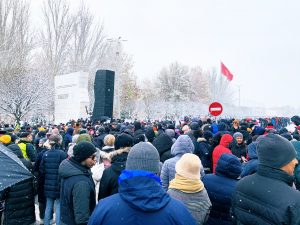On November 25, a crowd of 1200 people gathered in central Bishkek to give their government a “yellow card,” which referees use in soccer matches to warn players who misbehave.
The impetus for the protest was last week’s release of an investigation revealing massive state capture and money laundering on an unimaginable scale. The report, published by RFE/RL’s Kyrgyz service and Bishkek-based news platform Kloop with support from the Organized Crime and Corruption Reporting Project (OCCRP) on November 21, expanded on allegations about Kyrgyz customs service officials’ role in smuggling operations. Aierken Saimati, who provided the journalists with documents and description of his role in a $700 million dollar money-laundering scheme, was murdered in Istanbul on November 10.
Rayimbek Matraimov – one of the people Saimati implicated before he was murdered – was a powerful symbol for mobilizing Bishkek residents to protest. Protestors carried posters with Matraimov’s face plastered on them and chanted “Down with Rayim!” Matraimov, former deputy head of Kyrgyzstan’s customs service, is notorious in Kyrgyzstan; he has long been suspected of corruption, and was even investigated by the financial police last winter, but has evaded responsibility.
The protest was not only about Matraimov; corruption is a perennial frustration in Kyrgyzstan. Other demands – pithily wrapped up for chanting in front of the White House – included “thieves in jail” and “reaction, real reforms.”
The November 25 demonstration represents several victories for civil society in Kyrgyzstan. First, many expressed surprise and pride at how peaceful (and clean) the protests were. An unsanctioned public gathering like this is unimaginable in neighboring countries. Given Kyrgyzstan’s history with protests, it was not guaranteed that this demonstration would go smoothly, but police and protesters alike acted with restraint and respect.
Moreover, the high turnout and peaceful gathering sends authorities a strong signal about the strength of opposition in Kyrgyzstan. Whereas opposition has tended to be limited to electoral politics and defined by party affiliation, this protest was purely broad civic pressure. This movement is for the people and of the people; this shows officials that the ballot box is not the only relevant check on accountability.
Even so, we should be careful in treating the November 25 protest as an unequivocal win for Kyrgyzstan’s opposition.
While turnout was high in Bishkek, enthusiasm did not extend beyond the capital. Only a handful of people gathered in Karakol and two young men posted a photo of their parallel protest in Osh. This suggests limited mobilizing capacity outside Bishkek, perhaps a reflection of organizers’ use of Twitter – one of the less popular social media platforms in Kyrgyzstan – to get people on the streets.
Twitter analytics are a noisy measure of civic engagement, especially in a country with 34 percent internet penetration. As with coverage of the botched attempt at arresting former president Almazbek Atambayev in August, you would get a very different view of the November 25 protests depending on how you got your news. Posts in large Facebook groups expressed support for Matraimov and pitched the protest as a gay pride parade – a dangerous provocation in Kyrgyzstan.
Offline, public broadcaster KTRK’s coverage of the protest shrugged off the turnout and suggested that university students were shipped in to make the demonstrations look bigger than they were. Notably, Matraimov was not mentioned, nor were the protesters’ other demands. It’s easy to criticize KTRK for how it framed the protests, but the fact remains that most people in Kyrgyzstan get their news from television and the KTRK angle is how many understand the events of November 25.
Lastly, the government’s initial response suggests that even if officials are quick to react to protesters’ demands, officials will nonetheless drag their feet on reform. “Everyone supports fighting corruption, but in reality it plays out differently,” President Sooronbay Jeenbekov said on the afternoon of the protest. “Our population has reached 6.5 million people, and when you ask around, it’s clear that everyone is someone’s brother, in-law, or relative. And when some official is suspected of corruption, his relatives rush to defend them.” This half-hearted dodge suggests authorities will hide behind tropes about cultural norms to avoid rooting out corruption with earnest policy measures.
Despite these challenges, people seems intent on keeping the issue of corruption front and center. This single protest might not directly change the political situation in Bishkek, but the crowd sends a clear message to those in power that Kyrgyzstan’s population is done with being stolen from. The yellow cards protesters held up served as a warning of this sentiment, and suggest that people will gather again if their demands aren’t recognized.































